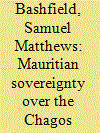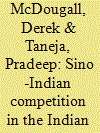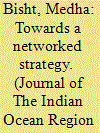|
|
|
Sort Order |
|
|
|
Items / Page
|
|
|
|
|
|
|
| Srl | Item |
| 1 |
ID:
177591


|
|
|
|
|
| Summary/Abstract |
Competition is a natural byproduct of major powers navigating an anarchic world. Small states operating in such a milieu however, face a dilemma when strategizing their foreign policy. At present, two regional behemoths – India and China – remain locked in a Realpolitik affray as they vie for influence by enticing and attracting South Asian states through economic, security and diplomatic initiatives. How do these structural dynamics impact Sri Lanka’s policymaking process? Moreover, has the island been able to mount a timely and appropriate response to structural dictates? In what way has domestic variables influenced and channeled policy preferences in Sri Lanka since 2015? By adopting a Neoclassical Realist frame of analysis, this paper appraises the impact made by the external environment and domestic intervening variables on the island’s foreign policy trajectory. It concludes that domestic intervening variables drew the island away from optimal choices in its relations with India and China.
|
|
|
|
|
|
|
|
|
|
|
|
|
|
|
|
| 2 |
ID:
177592


|
|
|
|
|
| Summary/Abstract |
This article examines the implications for the U.S. military base in Diego Garcia, located in the Chagos Archipelago, in the event that sovereignty of the atoll is ceded from the U.K. to Mauritius. Diego Garcia has become a critically important military base, facilitating U.S. power projection into the Indian Ocean, Middle East and Africa. The legality and future of British sovereignty over the atoll was challenged in 2019 in both the International Court of Justice and United Nations General Assembly. This article finds that Mauritian sovereignty of Diego Garcia would have considerable adverse consequences for U.S. military activity, potentially prohibiting many of the core functions the facility currently performs, as under U.K. sovereignty. Further, this article examines the strategic utility in Diego Garcia for the U.S. and U.K. governments, which demonstrates why these two nations are willing to endure considerable reputational costs and international backlash for retention of the atoll.
|
|
|
|
|
|
|
|
|
|
|
|
|
|
|
|
| 3 |
ID:
177590


|
|
|
|
|
| Summary/Abstract |
Discussion of Sino-Indian competition in the Indian Ocean region has focused on the two major powers, but there is scope to give more attention to the role of the island states. Using a structure-agency approach, this article assesses the agency of four Indian Ocean island states in relation to Sino-Indian competition: Sri Lanka, Maldives, Mauritius, Seychelles. In the context of India’s and China’s engagement with the island states, one can analyze the factors that either enhance or detract from the agency of those island states. These states have important economic links with both India and China without being overly dependent on either. India plays the leading security role, but China has also been developing its security links. Political consensus within an island state enhances leverage vis-à-vis the external powers, particularly in Mauritius and Seychelles; Sri Lanka and the Maldives have more conflictual politics, giving rise to greater Sino-Indian competition.
|
|
|
|
|
|
|
|
|
|
|
|
|
|
|
|
| 4 |
ID:
177593


|
|
|
|
|
| Summary/Abstract |
This article revisits the widely cited SAGAR speech by the Indian Prime Minister Narendra Modi, delivered on 12 March 2015, at Port Louis, Mauritius. It takes the speech as a foundation to revisit the meaning of maritime South Asia, bringing to fore a ‘networked identity’ of the Ocean. This approach, while incorporating a dimension of resilience, also offers a conceptual/policy window to deal with complex traditional and non-traditional threats emanating from maritime space. Concepts from network literature, such as connections, relationality and communication are employed to invoke networked imageries of the Ocean at a metaphorical, conceptual and praxeological level. In arguing for international/interregional maritime cooperation, SDG-14 is presented as an essential background condition for effective translation of SAGAR speech into this novel framework, which helps in raising critical questions related to maritime security and development.
|
|
|
|
|
|
|
|
|
|
|
|
|
|
|
|
| 5 |
ID:
177594


|
|
|
|
|
| Summary/Abstract |
The Mughal emperor Jahangir (reigned 1605–1627) was a knowledgeable naturalist with a keen interest in exotic fauna. In 1612 C.E. a strange primate was obtained from the Portuguese in Goa and brought to his court. The emperor’s written description of the animal and a contemporary painting suggest it was a lemur and therefore from Madagascar. Although many animals from the Moluccas and several from eastern Africa reached Jahangir, this is the only Madagascan animal to do so. Jahangir’s careful description of the animal and an illustration commissioned for his memoirs pre-date European scientific descriptions by a dozen years and reveal Jahangir as a fore-runner of comparative, descriptive zoology.
|
|
|
|
|
|
|
|
|
|
|
|
|
|
|
|
|
|
|
|
|